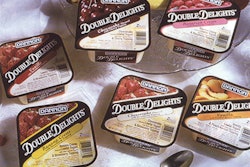
Meanwhile, gluten rules, in the sense of FDA’s new rules defining what it means for a food to be “gluten-free” and say so in its labeling, became effective in early August. The framework these rules set up is unique, perhaps because the issue of gluten in food presents some unique challenges.
Gluten’s not a major allergen, but the legal provisions leading to rules about it were included in the same law as the one for major allergens, the Food Allergen Labeling and Consumer Protection Act (FALCPA) of 2004. That law also set up new requirements for label statements about those 8 major allergens, namely milk, eggs, fish, Crustacean shellfish, tree nuts, peanuts, wheat, and soybeans.
The problems gluten presents are somewhat like those presented by major allergens: it creates health conditions in some people that can’t be cured, so those people affected by it just have to avoid it.
But gluten is unlike allergens in that lots of consumers avoid gluten in their diet, even though gluten’s not a health problem for many of them, though it’s a very serious problem for some of them.
Gluten or “glutens” are the proteins in wheat, rye, and barley or hybrids of them. For people with celiac disease, about 3 million Americans, consuming gluten in their food can cause damage to the small intestine, diminish their ability to absorb nutrients from food, and put them at higher risk of growth problems, intestinal cancers, and other serious health problems. There is no cure. For people who don’t have celiac but do have gluten sensitivity or intolerance, and there might be about 40 million of those, it’s also a problem, causing digestive symptoms, for example.
FDA’s new rules are aimed at protecting those with celiac disease and with gluten intolerance, which are serious health issues. Separately, such label claims might be useful to those consumers who believe avoiding gluten helps them lose weight or avoid unhealthy foods, misguided though they may be.
As you might have expected, the rules about when you call a food gluten-free are phrased in terms of things the food can’t have in it. Under the new definition, if you want to call a food “gluten-free” on its labeling it can’t contain as an ingredient a gluten-containing grain like spelt wheat, and it can’t contain an ingredient derived from such a grain if it hasn’t had its gluten removed (as might be processed wheat flour), and it can’t contain an ingredient from such a grain if the use of it results in 20 parts per million or more gluten in the food. (That is, even if you process the ingredient to take out the gluten, you have to get it down to a level of 20 ppm or below in the food.) You can claim a food is “gluten-free” if it inherently doesn’t contain gluten and any “unavoidable presence” of gluten in the food is below 20 ppm.
Get any of this wrong and the food is misbranded, unlawful for sale. Using phrases like “no gluten,” “free of gluten,” or “without gluten” instead of “gluten-free” won’t get you anywhere—the same rules apply to those.
The new rule even goes out of its way to try to avoid confusing consumers, saying, as FDA describes it, “a food whose labeling includes the term ‘wheat’ in the ingredient list or in a separate ‘Contains wheat’ statement as required by a section of the Federal Food, Drug, and Cosmetic Act (the FD&C Act) and also bears the claim ‘gluten-free’ will be deemed to be misbranded unless its labeling also bears additional language clarifying that the wheat has been processed to allow the food to meet FDA requirements for a ‘gluten-free’ claim.”
In its final subsection, the new rule also contains a preemption provision that says FDA’s new rule will override any State or local law that is different from the FDA rule. FDA spends a lot of time in the Federal Register announcement of the final rule explaining their reasoning for including that preemption provision. The crux of it is that FDA believes “there is a need for national uniformity” in the meaning of the phrase “gluten-free” so that “most individuals with celiac disease can make informed purchasing decisions that will enable them to adhere to a diet they can tolerate without causing adverse health effects and can select from a variety of available gluten-free foods.”
FDA further says it is obligated by a federal Executive Order to not preempt more than “necessary to achieve the objectives of the” law they are relying on in making the rules. As a result, they make clear that they only intend to preempt requirements made by State or local governments about “gluten-free” or its synonyms that are different from the federal requirement, or that deal with other label statements but in some way interfere with FDA’s goals of permitting and standardizing the term “gluten-free.”
Does all this mean that State or local governments will still be able to make their own rules about statements on labels about gluten other than that the food is free of gluten? Yes it does, says FDA. States might, FDA speculates, require “a statement about the health effects of gluten consumption on persons with celiac disease or information about how the food was processed."
Eric Greenberg can be reached at [email protected], or visit his firm’s Web site at www.ericfgreenbergpc.com.


























